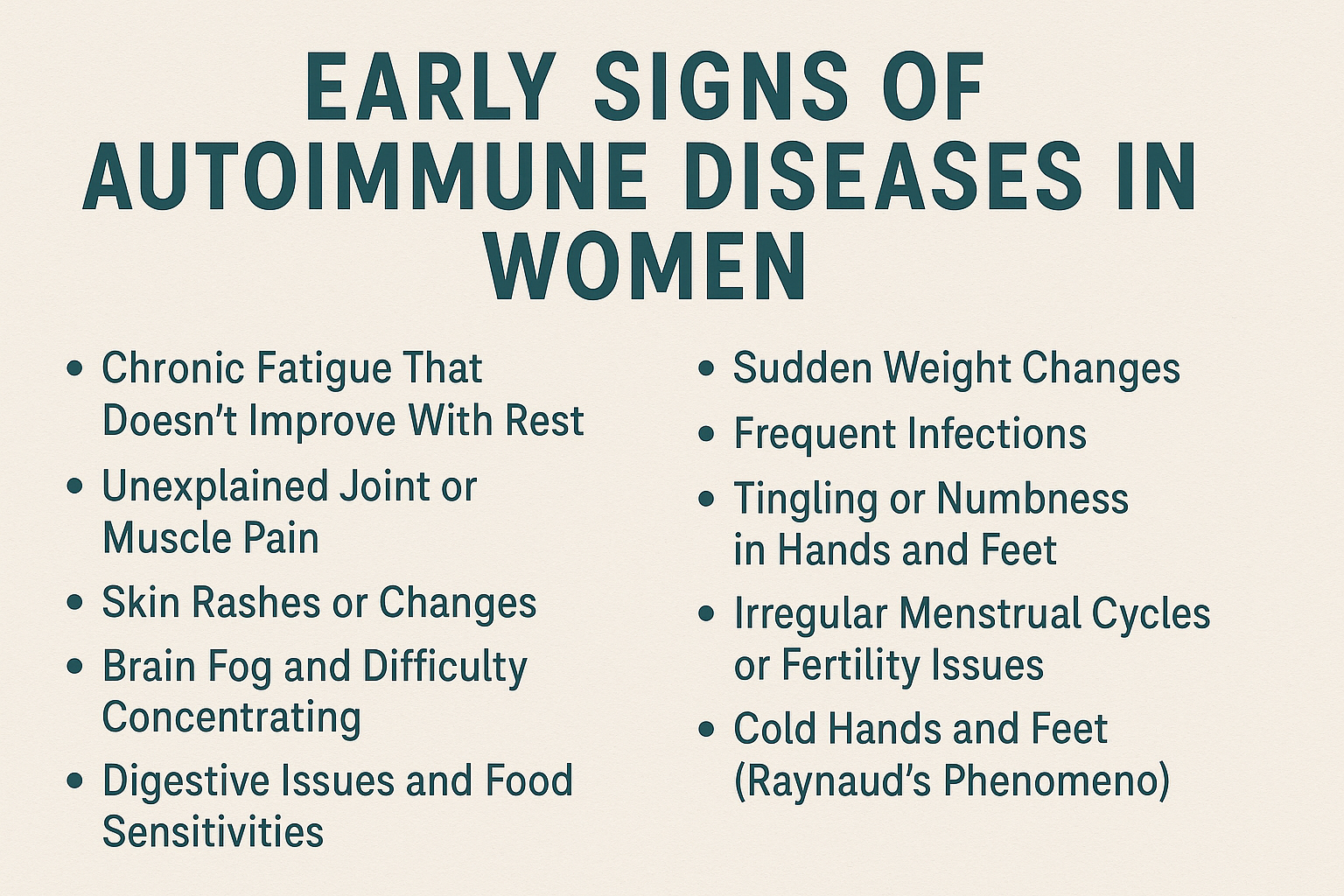Autoimmune diseases affect millions of people worldwide, and women are disproportionately impacted—accounting for nearly 80% of all autoimmune cases. Early detection is crucial. Understanding the subtle warning signs can help prevent long-term damage and improve quality of life. In this article, we’ll explore the early symptoms of autoimmune disorders in women, the reasons behind gender susceptibility, and expert-backed strategies for timely intervention.
📌 What Is an Autoimmune Disease?
An autoimmune disease occurs when the immune system mistakenly attacks the body’s own healthy cells, tissues, or organs. Instead of protecting you from threats, it becomes the threat. There are over 80 types of autoimmune conditions, including lupus, rheumatoid arthritis, Hashimoto’s thyroiditis, and multiple sclerosis.
👩⚕️ Why Are Women More Prone to Autoimmune Diseases?
-
Hormonal Influence: Fluctuations in estrogen and progesterone can alter immune system behavior.
-
Genetic Factors: X chromosomes carry more immune-related genes, and women have two.
-
Environmental Triggers: Stress, diet, and toxins affect women differently.
🔍 Early Signs of Autoimmune Diseases in Women
Recognizing the early warning signs can lead to faster diagnosis and better treatment outcomes. Below are some of the most common—yet often overlooked—early symptoms.
1. Chronic Fatigue That Doesn’t Improve With Rest
This is one of the earliest and most widespread signs. Unlike regular tiredness, autoimmune-related fatigue is persistent, overwhelming, and often described as “bone-deep exhaustion.”
2. Unexplained Joint or Muscle Pain
Women may notice pain or stiffness in the joints, especially in the morning or after periods of inactivity. It’s often symmetrical and not due to physical injury.
3. Skin Rashes or Changes
Conditions like lupus and psoriasis can cause butterfly-shaped rashes on the face, patchy redness, or scaly plaques. These skin issues usually flare up under stress or sun exposure.
4. Brain Fog and Difficulty Concentrating
Autoimmune inflammation can affect brain function. Women might report trouble remembering words, losing focus, or general cognitive sluggishness.
5. Digestive Issues and Food Sensitivities
Autoimmune diseases like celiac disease or Crohn’s can manifest early as bloating, diarrhea, constipation, or even nausea after eating.
6. Sudden Weight Changes
Unexpected weight loss or gain can result from autoimmune thyroid disorders like Hashimoto’s or Graves’ disease, often without a change in diet or activity.
7. Frequent Infections
A weakened or misdirected immune system may cause recurring colds, UTIs, yeast infections, or sinus infections.
8. Tingling or Numbness in Hands and Feet
Neurological symptoms like tingling or a pins-and-needles sensation can be an early sign of multiple sclerosis or lupus-related nerve inflammation.
9. Irregular Menstrual Cycles or Fertility Issues
Autoimmune disorders often affect reproductive hormones, potentially leading to missed periods, painful cycles, or even infertility.
10. Cold Hands and Feet (Raynaud’s Phenomenon)
Sudden changes in temperature or stress may cause fingers or toes to turn white or blue due to restricted blood flow, often linked with autoimmune conditions.
🧬 How Are These Symptoms Diagnosed?
Early detection depends on both clinical observation and lab work:
-
ANA (Antinuclear Antibody) Test
-
ESR and CRP (Inflammation markers)
-
Thyroid panel, vitamin D levels, and hormonal tests
Always consult a rheumatologist or autoimmune specialist for a comprehensive diagnosis.
🩺 What Are the First Signs of Autoimmune Diseases in Women?
The first signs of autoimmune diseases in women often include persistent fatigue, joint pain, skin rashes, and digestive problems. Other early symptoms may involve brain fog, weight changes, and increased sensitivity to cold. These signs are subtle but can progress rapidly without proper diagnosis.
🌿 Lifestyle Changes That Support Autoimmune Health
1. Anti-Inflammatory Diet
Incorporate omega-3s, turmeric, leafy greens, and avoid gluten or processed sugars.
2. Stress Management
Chronic stress is a known trigger. Practices like yoga, meditation, and deep breathing help regulate immune function.
3. Gut Health Optimization
Use probiotics, prebiotics, and eliminate foods that trigger symptoms to balance the microbiome.
4. Adequate Sleep
Quality sleep is non-negotiable. Aim for 7–9 hours nightly to regulate immune responses.
💼 Pro Tips from Autoimmune Experts
-
Track your symptoms daily using a journal or app—it helps your doctor make accurate diagnoses.
-
Don’t dismiss mild signs, especially if they persist over weeks or worsen with your cycle.
-
Join an autoimmune support group—sharing experiences often leads to faster discoveries.
-
Request comprehensive blood work even if your GP says “you look fine.”
-
Avoid self-diagnosing; always work with a specialist.
-
Get a second opinion if your symptoms are brushed off.
❓ Frequently Asked Questions (FAQ)
Can autoimmune diseases be cured?
There’s no universal cure, but many are manageable with early intervention, lifestyle changes, and the right medications.
Are autoimmune symptoms worse during menstruation?
Yes, hormonal fluctuations can intensify autoimmune responses in women, especially around the luteal phase.
Is brain fog from autoimmune disease permanent?
Not necessarily. With proper treatment, many women report a clear improvement in cognitive function.
Should I avoid vaccines if I have an autoimmune disease?
Not all vaccines are contraindicated. Discuss each vaccine with your specialist to determine the best approach.
What autoimmune diseases are most common in women?
Hashimoto’s thyroiditis, lupus, multiple sclerosis, and rheumatoid arthritis are among the most prevalent.
💬 What Do You Think?
Have you noticed any of these symptoms in your daily life?
👉 Share your experience or questions in the comments—your voice could help someone else!



